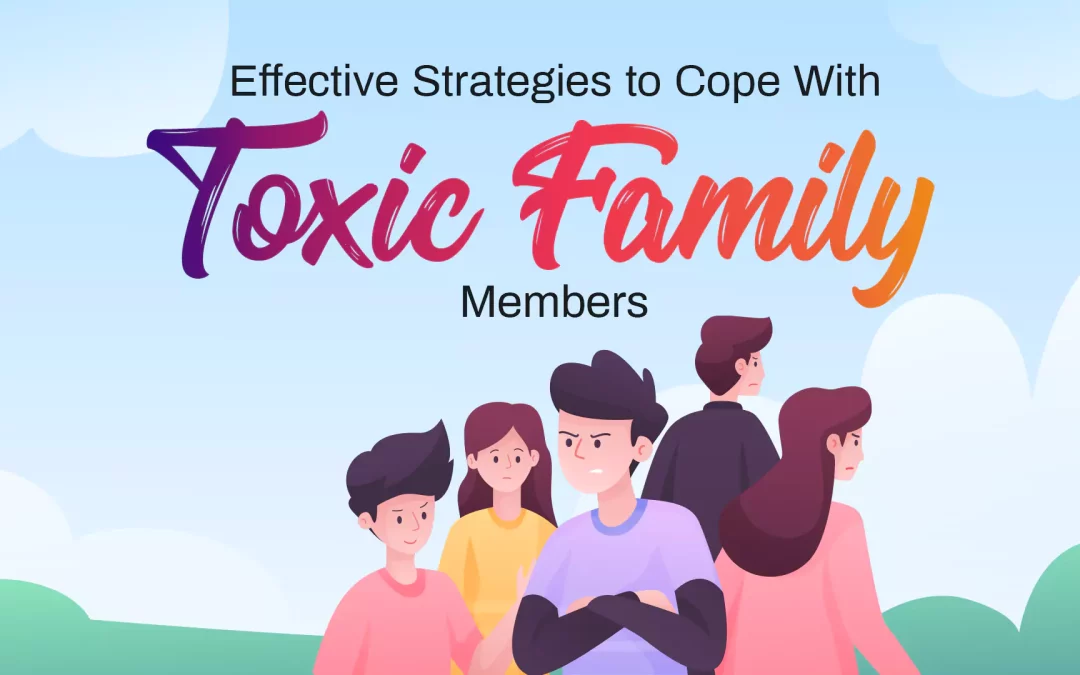A toxic family member often exhibits behaviors that are manipulative, controlling, and emotionally damaging to others. They might engage in constant criticism, manipulation, disregard for boundaries, and emotional or verbal abuse. Toxic family members can create an unhealthy and stressful environment, impacting the well-being of those around them.
Toxic behavior happens when someone acts in mean or hurtful ways towards others. This can be because of things that happened to them in the past, their personality, or how they learned to behave from their family or friends. It’s not okay, even if there are reasons behind it.
Coping with Toxic Family Members
Coping with problematic family members can be challenging, but there are strategies you can use to navigate these difficult relationships. Whether you’re dealing with constant criticism, manipulation, or emotional abuse, it’s important to prioritize your well-being and mental health. In this blog post, we’ll explore effective strategies to cope with toxic family members and maintain your emotional balance.
Making Rules
When you have toxic family members, it’s important to make clear rules. These rules should say what behavior is not okay, and you need to tell them these rules in a calm but strong way. Make sure you stick to these rules to keep yourself feeling okay.
Limit Interaction
If you have the option, consider spending less time with family members who are unkind or hurtful. By doing so, you can reduce your exposure to their negative behavior, which, in turn, allows you the space and opportunity to improve your well-being and feel more positive.
Prioritize Self-Care
Make time for activities that boost your overall well-being and bring you joy. This might involve pursuing hobbies you love, staying active through exercise, finding peace through meditation, or surrounding yourself with supportive individuals. By looking after yourself, you’ll build resilience and better manage the difficulties you face.
Learn to Speak Up Confidently
Getting better at expressing your needs and worries without being mean can help you talk to difficult family members. This skill allows you to express yourself effectively while treating them with respect and courtesy.
Adjust Your Expectations
Understand that you might not be able to change toxic family members. Instead, shift your focus to managing your own responses and feelings. This way, you can find more control and peace in difficult situations.
Build a Supportive Network
Surround yourself with friends and chosen family who uplift and encourage you. A strong network can provide the love and validation you might not receive from toxic family members.
Practice Emotional Detachment
Work on distancing yourself emotionally from the hurtful actions and words of toxic family members. Keep in mind that their behavior reflects their own problems, not your value or worth. This emotional detachment can empower you to better navigate difficult interactions.
Focus on Growth and Healing
View the difficulties presented by toxic family members as chances for your personal growth and emotional healing. Dedicate yourself to developing resilience and inner strength, which will help you thrive despite the challenges you face.
Consider Professional Help
If the toxicity becomes overwhelming, consider seeking therapy or counseling. A mental health professional can offer guidance and coping strategies tailored to your situation.
Coping with challenging family members can be a long and challenging process. It’s important to prioritize your own mental and emotional health throughout the journey and seek professional help if needed.
Additional Approaches for Dealing with Toxic Family Members
Certainly, here are some different strategies to cope with challenging family members:
Gray Rock Technique
Actively disengage and make yourself as uninteresting as possible when dealing with toxic family members. Respond with bland, non-committal answers to avoid escalating conflicts.
Practice Emotional Detox
Regularly engage in activities that help you release and manage your emotions, such as journaling, art, or physical exercise.
Use “I” Statements
When addressing issues, express your feelings using “I” statements to avoid accusatory language. For example, say,
“I feel hurt when you do this,” instead of “You always hurt me.”
“I feel upset when this happens,” instead of “You’re always causing me trouble.”
Stay Grounded
Focus on staying rooted in the present moment to prevent past or future worries from taking over during interactions.
Practice Mindfulness
Develop mindfulness techniques to manage your emotional reactions and stay centered during difficult interactions.
Engage in Distraction
When necessary, divert your attention to a positive or enjoyable activity to avoid getting caught up in toxic dynamics.
Stay Goal-Oriented
Focus on your long-term goals and aspirations, reminding yourself of what’s truly important in your life.
Forgive and Let Go
Consider forgiveness as a way to release yourself from the burden of holding onto anger or resentment. It doesn’t mean you condone their behavior but can free you from its emotional weight.
Learn Conflict Resolution Skills
Acquire skills in conflict resolution, which can help you manage and potentially resolve issues more effectively.
Therapy or Counseling
Individual therapy can provide a safe space to explore your feelings and develop strategies for coping with toxic family members.
Educate Yourself
Understand the psychology behind toxic behavior and consider reading books or attending workshops that focus on dealing with difficult family dynamics.
Create a Safety Plan
If their behavior becomes dangerous or physically abusive, create a safety plan that includes steps to protect yourself and seek help.
Remember that different strategies work for different people, and it may take some trial and error to find what works best for your specific situation. Also, don’t hesitate to seek professional guidance if you feel overwhelmed or unsafe in dealing with toxic family members.


Let me marry first, then I will read these suggestions 😀
It’s not their post or personality, it’s just a pasoori to not let the couples happy.
I appreciate the way you’ve outlined practical strategies for dealing with such a difficult situation.